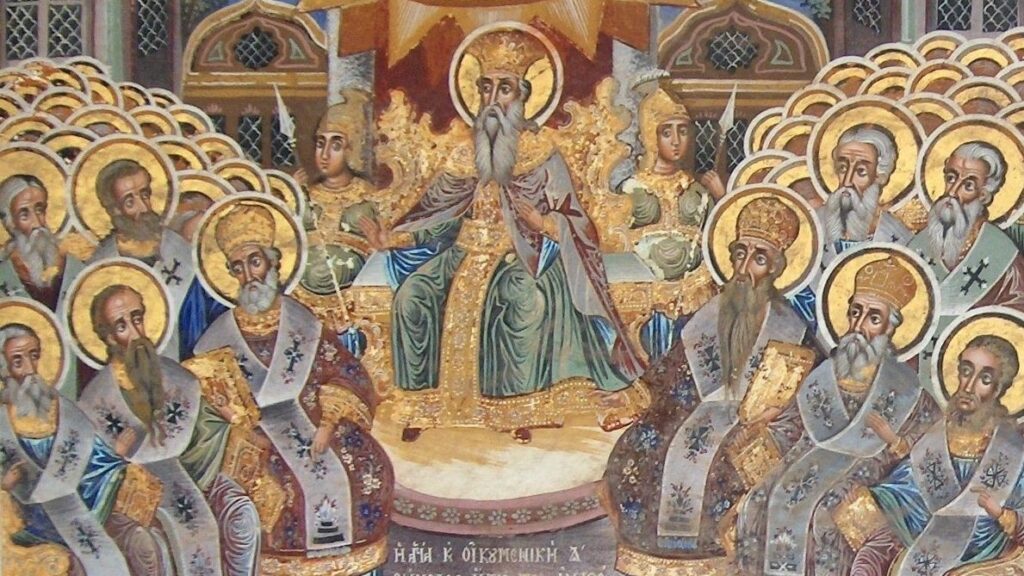In the name of the Father, and of the Son, and of the Holy Spirit, one God, Amen.
“You are the light of the world,” says the Lord, and in commenting on this St John Chrysostom tells us, “’Of the world’ again; not of one nation, nor of twenty states, but of the whole inhabited earth.” (Homilies on Matthew, XV, 11) For we are called not only to be witnesses of the Gospel—the defeat of death, sin and idolatry—to some but to all. And the Lord demonstrates to us how this may be achieved,

Nor do men light a lamp and put it under a bushel, but on a stand, and it gives light to all in the house. Let your light so shine before men, that they may see your good works and give glory to your Father who is in Heaven.
Since it is not by preaching at people, shouting at people, that the Gospel may be transmitted, rather that others “see [our] good works and give glory to [our] Father who is in Heaven.” Notice, too, how this is not dependent on their response, whether they themselves glorify God or not is immaterial, what concerns us is that we “give glory to [our] Father.”
And I consider my life, and do I do good works or do I look down upon others telling them why I am right and they are wrong? Do I serve or do I gossip, slander and back-bite? Am I the one, against whom the Apostle warns, who engages in, “stupid controversies, genealogies, dissensions, and quarrels over the law”?
And I must change, I must give up the need to be right, to be above others, and place myself at their—at your!—service. I must “[do] good works and give glory to [our] Father who is in Heaven.” I must let the light of God shine out through me into the world.
My dear brothers and sisters in Christ, the Church is “[The] City set on a hill [which] cannot be hid.” And we are, each one of us, called to be the lights of our City that we illumine not only this hill-top but are beacons to those around us—offering them true knowledge of Truth and Life. Let us do good works and serve this Liturgy which we offer, “on behalf of all and for all,” (Anaphora, The Divine Liturgy) that the Gospel of the Victory of Christ be preached here and to all peoples.
That we may follow our Great God and Saviour Jesus Christ in service and performing good works, offering him praise, glory and honour, and thereby come to knowledge of his unoriginate Father by the power and operation of the All-holy Spirit, Amen.
Titus, my son, the saying is sure. I desire you to insist on these things, so that those who have believed in God may be careful to apply themselves to good deeds; these are excellent and profitable to men. But avoid stupid controversies, genealogies, dissensions, and quarrels over the law, for they are unprofitable and futile. As for a man who is factious, after admonishing him once or twice, have nothing more to do with him, knowing that such a person is perverted and sinful; he is self-condemned. When I send Artemas or Tychicos to you, do your best to come to me at Nicopolis, for I have decided to spend the winter there. Do your best to speed Zenas the lawyer and Apollos on their way; see that they lack nothing. And let our people learn to apply themselves to good deeds, so as to help cases of urgent need, and not to be unfruitful. All who are with me send greeting to you. Greet those who love us in the faith. Grace be with you all. Amen.
— Titus 3:8–15
The Lord said to his disciples, “You are the light of the world. A city set on a hill cannot be hid. Nor do men light a lamp and put it under a bushel, but on a stand, and it gives light to all in the house. Let your light so shine before men, that they may see your good works and give glory to your Father who is in heaven. Think not that I have come to abolish the law and the prophets; I have come not to abolish them but to fulfill them. For truly, I say to you, till heaven and earth pass away, not an iota, not a dot, will pass from the law until all is accomplished. Whoever then relaxes one of the least of these commandments and teaches men so, shall be called least in the kingdom of heaven; but he who does them and teaches them shall be called great in the kingdom of heaven.”
— Matthew 5:14–19
